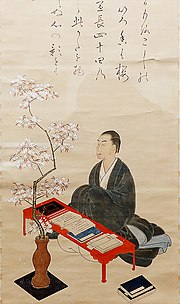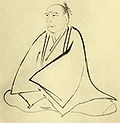Motoori Norinaga (本居 宣長, 21 June 1730 – 5 November 1801) was a Japanese scholar of Kokugaku active during the Edo period. He is conventionally ranked as...
17 KB (2,020 words) - 12:52, 27 September 2024
in the hands of Motoori Norinaga, who obtained a copy of the Kan'ei printed edition in 1754. After meeting Mabuchi in 1763, Norinaga began to devote his...
50 KB (6,255 words) - 18:38, 30 July 2024
philologist during mid-Edo period Japan. Along with Kada no Azumamaro, Motoori Norinaga, and Hirata Atsutane, he was regarded as one of the Four Great Men...
5 KB (514 words) - 04:20, 4 October 2023
44-volume commentary on the Kojiki written by the kokugaku scholar Motoori Norinaga. The Kojiki-den is a commentary on the Kojiki, an eighth-century work...
4 KB (373 words) - 01:08, 6 January 2024
Yamato-damashii (大和魂). It has also been described in Japanese literature. Motoori Norinaga (1730–1801) devoted about 35 years of his life to the elaboration of...
4 KB (440 words) - 09:16, 15 September 2024
Japanese definitions of the mitama, developed later by many thinkers like Motoori Norinaga, maintain it consists of several "spirits", relatively independent...
6 KB (759 words) - 21:58, 17 October 2024
philosophy. They are traditionally enumerated as: Kada no Azumamaro Kamo no Mabuchi Motoori Norinaga Hirata Atsutane Japanese definition 個人的には納得できない「国学の四大人...
767 bytes (70 words) - 04:21, 4 October 2023
Kokugaku, and student of the Japanese language. He was a first son of Motoori Norinaga. He was called Kenzo (健蔵) in childhood. Haruniwa followed his father...
2 KB (197 words) - 19:22, 10 October 2023
University of Washington Press, 1964, pp. 66 ff. Motoori, Norinaga (2007). The Poetics of Motoori Norinaga: A Hermeneutical Journey Archived 3 July 2023...
84 KB (9,524 words) - 15:39, 14 December 2024
studies") or inishie manabi ("antiquity studies"), a term favored by Motoori Norinaga and his school. Drawing heavily from Shinto and Japan's ancient literature...
8 KB (798 words) - 19:29, 17 December 2024
picked up and used by 18th century Edo period Japanese cultural scholar Motoori Norinaga in his literary criticism of The Tale of Genji, and later to other...
11 KB (1,157 words) - 04:02, 29 November 2024
mythical origins of Japan's people, culture, and the imperial family. Motoori Norinaga, an Edo-period Japanese scholar, interpreted Kojiki and his commentary...
28 KB (3,643 words) - 07:26, 29 October 2024
authors expressing their own opinions on the god's role and importance. Motoori Norinaga, in his commentary on the Kojiki, criticized the Watarai priesthood...
23 KB (2,585 words) - 15:14, 20 September 2024
'master of the water'". Here Minakata draws on Edo Period scholar Motoori Norinaga' suggestion that the -chi signified an honorific. As stated above folklorist...
24 KB (2,745 words) - 00:54, 17 November 2024
History . . of Japan . 日本歴史. Retrieved 2023-12-10. Norinaga Motoori (2007). The Poetics of Motoori Norinaga: A Hermeneutical Journey. University of Hawaii...
4 KB (1,027 words) - 12:59, 11 September 2023
houses of other nations. These ideas were expanded by Kokugaku scholar Motoori Norinaga, and seen in Takenouchi Shikibu's theory of absolute loyalty to the...
9 KB (1,013 words) - 11:29, 22 November 2024
in the late Edo period waka faced new trends from beyond the court. Motoori Norinaga, the great reviver of the traditional Japanese literature, attempted...
22 KB (2,544 words) - 19:33, 7 February 2024
the collection as pure and simple. Through his study of the Kojiki, Motoori Norinaga argued that the essence of the Japanese literature came from "mono...
27 KB (3,526 words) - 06:04, 16 December 2024
where various kami and spirits of ancestors live with eternal youth. Motoori Norinaga categorized three types of Tokoyo: a world of perpetual darkness, a...
14 KB (1,359 words) - 18:08, 20 September 2024
asahi ni niou yamazakura bana by the Japanese classical scholar, Motoori Norinaga. The poem reads: If someone asks about the Yamato spirit [Spirit of...
82 KB (10,016 words) - 07:05, 15 December 2024
Genji tr. Edward Seidensticker, 1976, 1:362) Each man, according to Motoori Norinaga (who wrote a Commentary of The Tale of Genji ), has at his birth a...
21 KB (2,733 words) - 10:15, 1 November 2024
It contains the grave of the Edo period kokugaku scholar Motoori Norinaga and his son Motoori Harunaga, which was collectively designated a National Historic...
4 KB (341 words) - 13:05, 19 September 2024
Japanese scholars in the 19th century such as Hirata Atsutane and Motoori Norinaga have used the global flood myths of other cultures to argue for the...
20 KB (2,313 words) - 01:24, 13 December 2024
poetry written in 1763 by the eighteenth century Japanese scholar Motoori Norinaga. Norinaga was one of the leading scholars in the Kokugaku (国学, lit. 'National...
2 KB (265 words) - 06:58, 28 September 2024
Fujiwara Seika Hayashi Razan Nakae Tōju Itō Jinsai Ogyū Sorai Kokugaku Motoori Norinaga Modern Thought Statism Kyoto School Kitaro Nishida Korea Traditions...
42 KB (4,597 words) - 19:54, 21 December 2024
the word kami was derived from Ainu word kamuy. In his Kojiki-den, Motoori Norinaga gave a definition of kami: "any being whatsoever which possesses some...
34 KB (4,285 words) - 19:45, 16 December 2024
from a more academic standpoint. Scholars such as Kamo no Mabuchi and Motoori Norinaga first advanced the theory of Kodō, followed by Hirata Atsutane and...
7 KB (936 words) - 16:50, 9 February 2024
re-discovery. The Edo period linguists Kamo no Mabuchi (1765) and Motoori Norinaga (1767–1798) separately and independently identified the law during...
25 KB (2,606 words) - 13:58, 26 November 2024
her domain Yamatai. The Edo-period philosophers Arai Hakuseki and Motoori Norinaga began the controversies over whether Yamatai was located in Northern...
49 KB (6,100 words) - 18:51, 21 December 2024
ancestor of the Ki clan. During the medieval and early modern periods, Motoori Norinaga in his commentary on the Kojiki wrote that Kamimusubi and Takamimusubi...
7 KB (1,401 words) - 19:40, 28 October 2024












